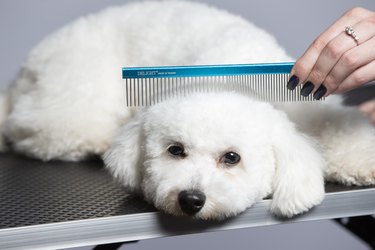When it comes to skin problems, most dogs go through some sort of issue during their lifetime. Skin allergies are the most common skin issue in young bichon frises. Middle-age and older bichon frise dogs may develop warts and tumors. For some of the more mild skin problems with your bichon, such as skin dryness, you can use a home remedy for treatment, like coconut oil or a similar product, but most skin issues require veterinary attention.

Video of the Day
Allergic reaction causes in bichon frises
With the bichon frise, allergies can be a common issue. With dogs, allergic reactions generally manifest themselves in their skin. Common canine allergens, such as fleas, certain foods, molds, and other environmental triggers, can cause your bichon frise to scratch, chew themself, and lose their hair.
Video of the Day
This trauma often results in skin infections. While a monthly topical or oral flea preventive can control flea allergies, food and other allergies require extensive testing and treatment by your veterinarian.
Sebaceous cysts on the bichon frise breed
Sebaceous cysts are common in the bichon frise breed. These cysts contain sebum, an oily material created by the sebaceous glands. The cysts develop around the sebaceous glands near hair follicles. If your bichon frise scratches or bites at the cyst, a secondary infection could occur.
Do not squeeze a sebaceous cyst to try to expel the sebum. Your veterinarian must surgically remove this growth and will prescribe antibiotics for a related infection.

Old dog warts on elderly canines
All elderly canines are subject to developing "old dog warts." These growths are particularly common in elderly bichon frise. These are not the same papillomas commonly appearing and disappearing in younger dogs. Old dog warts appear anywhere on the body and generally look like raised pink growths. Other colors also occur, including gray or black.
While these warts are usually just a cosmetic issue and are benign, they can ulcerate if located in an area where the dog licks or scratches them. Always have your veterinarian inspect your elderly bichon frise's wart to ensure it is not actually a tumor. The veterinarian can remove the wart if it bothers your pet or if the wart is in a spot on your dog that is making them uncomfortable.
Bichon frise pilomatricomas
Pilomatricomas, also known as calcifying epithelioma of Malherbe, are hair follicle tumors common in aging bichons. These small tumors formed in the hair root may be benign or malignant. There is no reason to panic at first sight of them.
They appear primarily on the animal's trunk. They look just like another hair follicle tumor, trichoepithelioma, which is almost always benign. However, the contents of the pilomatricoma mineralize, so they seem gritty as opposed to the typically cheesy contents of the trichoepithelioma. Your veterinarian will surgically remove the tumor and test it for cancer with a biopsy. Fortunately, malignancy is relatively rare. It's important to note that once one pilomatricoma develops on your dog, others will usually follow.

Hair loss in bichon frises
Bichon frise hair loss can be a common issue, especially at the site of vaccinations, which is a condition known as injection site alopecia. The hair loss does not occur immediately after the inoculation but as much as 10 months later.
Usually, the hair loss becomes apparent between three and six months post-vaccination. In addition to the vaccination site, some dogs start losing hair on other parts of the body, including the legs, face, and tail tip. Thickening of the skin and lesions may also occur. Your veterinarian can biopsy the affected area to diagnose the condition and prescribe medication that may reverse the alopecia.